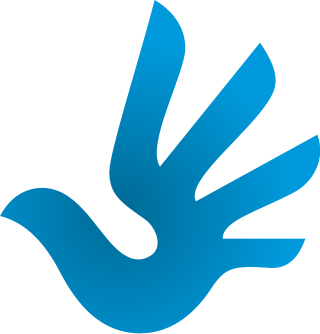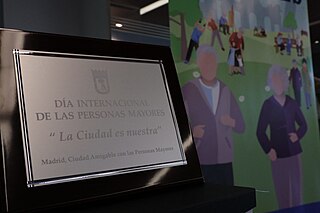Related Research Articles

The Universal Declaration of Human Rights (UDHR) is an international document adopted by the United Nations General Assembly that enshrines the rights and freedoms of all human beings. Drafted by a UN committee chaired by Eleanor Roosevelt, it was accepted by the General Assembly as Resolution 217 during its third session on 10 December 1948 at the Palais de Chaillot in Paris, France. Of the 58 members of the United Nations at the time, 48 voted in favour, none against, eight abstained, and two did not vote.

The United Nations Economic and Social Council is one of the six principal organs of the United Nations, responsible for coordinating the economic and social fields of the organization, specifically in regards to the fifteen specialised agencies, the eight functional commissions, and the five regional commissions under its jurisdiction.

The United Nations Human Rights Council (UNHRC) is a United Nations body whose mission is to promote and protect human rights around the world. The Council has 47 members elected for staggered three-year terms on a regional group basis. The headquarters of the Council are at the United Nations Office at Geneva in Switzerland.

Human Rights Day (HRD) is celebrated annually around the world on 10 December every year.

On 8 September 2000, following a three-day Millennium Summit of world leaders gathered in New York at the headquarters of the United Nations, the UN General Assembly adopted some 60 goals regarding peace; development; environment; human rights; the vulnerable, hungry, and poor; Africa; and the United Nations which is called Millennium Declaration . A follow-up outcome of the resolution was passed by the General Assembly on 14 December 2000 to guide its implementation. Progress on implementation of the Declaration was reviewed at the 2005 World Summit of leaders. The Declaration includes 8 chapters and 32 paragraphs.

The International Day of Peace, also officially known as World Peace Day, is a United Nations-sanctioned holiday observed annually on 21 September. It is dedicated to world peace, and specifically the absence of war and violence, such as might be occasioned by a temporary ceasefire in a combat zone for humanitarian aid access. The day was first established in 1981 and first observed in September 1982 and is kept by many nations, political groups, military groups, and people.
The United Nations Human Settlements Programme (UN-Habitat) is the United Nations programme for human settlements and sustainable urban development. It was established in 1977 as an outcome of the first United Nations Conference on Human Settlements and Sustainable Urban Development held in Vancouver, Canada, in 1976. UN-Habitat maintains its headquarters at the United Nations Office at Nairobi, Kenya. It is mandated by the United Nations General Assembly to promote socially and environmentally sustainable towns and cities with the goal of providing adequate shelter for all. It is a member of the United Nations Development Group. The mandate of UN-Habitat derives from the Habitat Agenda, adopted by the United Nations Conference on Human Settlements in Istanbul, Turkey, in 1996. The twin goals of the Habitat Agenda are adequate shelter for all and the development of sustainable human settlements in an urbanizing world.

The International Holocaust Remembrance Day, or the International Day in Memory of the Victims of the Holocaust, is an international memorial day on 27 January that commemorates the victims of the Holocaust, which resulted in the genocide of one third of the Jewish people, along with countless members of other minorities by Nazi Germany between 1933 and 1945, an attempt to implement its "final solution" to the Jewish question. 27 January was chosen to commemorate the date when the Auschwitz concentration camp was liberated by the Red Army in 1945.

France has been a member of the United Nations (UN) since its foundation in 1945 and is one of the five countries, alongside China, Russia, the United Kingdom, and the United States, that holds a permanent seat on the United Nations Security Council (UNSC), which is responsible for maintaining international peace and security.

The Convention on the Rights of Persons with Disabilities is an international human rights treaty of the United Nations intended to protect the rights and dignity of persons with disabilities. Parties to the convention are required to promote, protect, and ensure the full enjoyment of human rights by persons with disabilities and ensure that persons with disabilities enjoy full equality under the law. The Convention serves as a major catalyst in the global disability rights movement enabling a shift from viewing persons with disabilities as objects of charity, medical treatment and social protection towards viewing them as full and equal members of society, with human rights. The convention was the first U.N. human rights treaty of the twenty-first century.

The International Day of Older People is observed on October 1 each year.
A sighted child who is reading at a basic level should be able to understand common words and answer simple questions about the information presented. They should also have enough fluency to get through the material in a timely manner. Over the course of a child's education, these foundations are built on to teach higher levels of math, science, and comprehension skills. Children who are blind not only have the education disadvantage of not being able to see: they also miss out on the very fundamental parts of early and advanced education if not provided with the necessary tools.
The official languages of the United Nations are the six languages used in United Nations (UN) meetings and in which the UN writes all its official documents.

United Nations General Assembly Resolution 68/262 was adopted on 27 March 2014 by the sixty-eighth session of the United Nations General Assembly in response to the Russian annexation of Crimea and entitled "territorial integrity of Ukraine". The nonbinding resolution, which was supported by 100 United Nations member states, affirmed the General Assembly's commitment to the territorial integrity of Ukraine within its internationally recognized borders and underscored the invalidity of the 2014 Crimean referendum. Eleven nations voted against the resolution, while 58 abstained, and a further 24 states were absent when the vote took place.

Tiffany Brar is an Indian community service worker who became blind as an infant due to oxygen toxicity. Brar is the founder of the Jyothirgamaya Foundation, a non-profit organization that teaches life skills to blind people of all ages. She is a trainer, a campaigner for disability awareness and an advocates for an inclusive society.
The International Decade for People of African Descent, 2015–2024, was proclaimed by the UN General Assembly in a Resolution (68/237) adopted on 23 December 2013. The theme of the International Decade is "People of African descent: recognition, justice and development".
Bengt Olof Lennart Lindqvist was a Swedish politician and advocate of persons with disabilities.
The following lists events that happened with or in collaboration with the United Nations and its agencies in the year 2019.
The following lists events that happened with or in collaboration with the United Nations and its agencies in the year 2020.

The right to a healthy environment or the right to a sustainable and healthy environment is a human right advocated by human rights organizations and environmental organizations to protect the ecological systems that provide human health. The right was acknowledged by the United Nations Human Rights Council during its 48th session in October 2021 in HRC/RES/48/13 and subsequently by the United Nations General Assembly on July 28, 2022 in A/RES/76/300. The right is often the basis for human rights defense by environmental defenders, such as land defenders, water protectors and indigenous rights activists.
References
- ↑ "Resolution adopted by the General Assembly on 17 December 2018 - World Braille Day" (PDF). undocs.org. United Nations. Retrieved 2024-01-14.
- ↑ "World Braille Day, 4 January". www.un.org. United Nations. Retrieved 2024-01-14.
- ↑ "World Braille Day celebrated at Jamia Millia Islamia". The Times of India. Retrieved 2019-10-25.
- ↑ "First-ever World Braille Day underscores importance of written language for human rights". UN News. 2019-01-03. Retrieved 2019-10-25.
- ↑ Rastogi, Pracarsh (2019-01-03). "World Braille Day: Education tools for the visually-impaired". The Hindu. ISSN 0971-751X . Retrieved 2019-10-25.